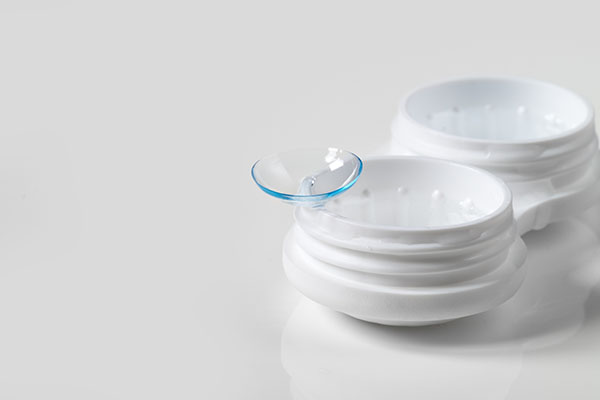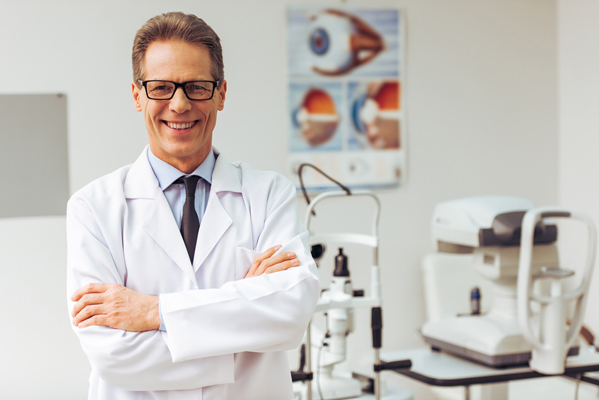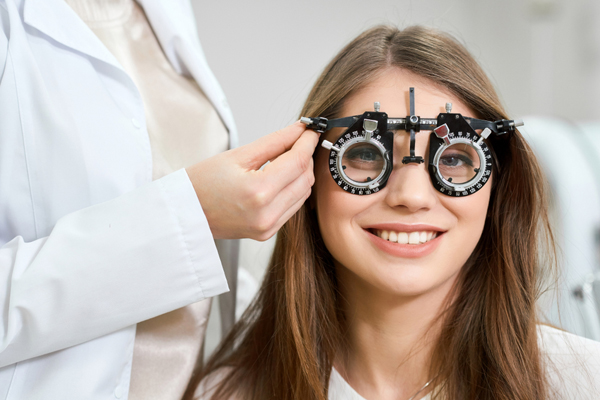Contact Lens Exams

While many people are content wearing glasses, others prefer a more discreet option that does not require lenses and frames on their face -- though it might require contact lens exams. Contact lens exams consist of special tests that are typically not part of a routine eye exam for prescription glasses. A contact lens exam helps an optometrist determine if the patient is a candidate for wearing contact lenses.
Since contact lens exams are unique, anyone interested in getting contact lenses needs to inform us when scheduling an appointment. With this exam, we can help determine which type of contact lenses will meet the patient's needs. Call us to learn more about a contact lens exam or to schedule an appointment.
What goes on during contact lens exams?
During the appointment, the professional will perform a comprehensive examination, testing the patient's visual acuity and overall health. To measure visual acuity, they will only need an eye chart with rows of letters that get smaller down the page. Patients will read specific rows in order to determine how well they can read various sizes of print from farther away.
Upon completing this part of the exam, the office will gather information to help fit the patient with contact lenses. They will also go over the patient's various preferences and the proper level of care their contact lenses will need. Depending on the result of the contact lens exams, they might talk to the patient about rigid gas permeable (hard) contact lenses.
Gas permeable lenses are not as comfortable as soft lenses, but they do provide the sharpest images. If the patient is over the age of 40, they will also examine the patient for presbyopia. Presbyopia is a condition that makes it difficult to focus on near objects and read the small print. Bifocal or multifocal contact lenses can help to address this condition.
The fitting
Contact lenses are customized for each patient. If the curvature of the lenses does not match the curvature of the patient's eyes, it can lead to discomfort and even damage to the eye. During the fitting for contact lenses, an optometrist will:
- Measure the curvature of the patient's eye using an instrument known as a keratometer for a comfortable fit
- Inspect the surface of the patient's eye using a biomicroscope
- Get additional measurements of the patient's cornea using a corneal topographer
- Perform wavefront measurements to evaluate how well the patient's eyes focus light
- Recommend toric lenses if the patient's cornea has an irregular shape (astigmatism)
- Take measurements of the patient's pupil and iris
We will take the time to ensure the contact lenses are the right fit for the patient. With the professional guidance of our team, we can help the patient receive the visual aid they need.
What happens after contact lens exams?
After the examination, we will fit the patient with trial lenses. We might use a biomicroscope to evaluate how well the trial lenses fit before sending the patient home. We will then schedule a follow-up appointment to inspect the patient's eyes. If everything looks good, we will create a prescription and order the customized contacts. It usually takes a few weeks to prepare the order.
Once we give the first order to the patient, we will go over how to place the contact lenses as well as how to clean them if they are reusable ones. We can also explain how the patient can order more.
Frequently asked questions about prescription contact lenses exams
Considering getting contact lenses? Let us go over the answers to a handful of questions you might have:
1. Why do I need a prescription for contact lenses?
A prescription is needed for contact lenses because they are considered a medical device. Just as you need a prescription for glasses, you need one for contacts to ensure that they are correctly fitted and will be safe and comfortable for you to wear.
2. How often do I need to have an exam?
It is generally recommended that you have an exam every year or as often as your doctor recommends. This gives them a chance to check the health of your eyes and make sure that your contact lenses are still fitting well.
3. What happens during a contact lens exam?
During a contact lens exam, the doctor will assess the health of your eyes and determine the correct prescription for your contact lenses. They will also measure the curve of your cornea and check the fit of your lenses.
4. Do I need to bring something to my exam?
Yes, you will need to bring your current contact lens prescription to your exam. If you do not have a recent prescription, the doctor may be able to provide one for you.
5. How long does a contact lens exam take?
A contact lens exam generally takes about 30 minutes. However, if you have any challenges with your lenses or have questions about them, the appointment may take longer.
We are here to help
Call us today to schedule an appointment if you are interested in getting contact lenses.
Request an appointment here: https://brighteyesmv.com or call Bright Eyes Optometry at (914) 668-1429 for an appointment in our Mt Vernon office.
Check out what others are saying about our services on Yelp: Read our Yelp reviews.
Recent Posts
Emergency eye care is needed if you find yourself dealing with a problem with your eye that causes pain or affects your vision. Failing to treat eye injuries as soon as they are detected can lead to permanent consequences, like reduced vision or blindness. Common eye injuries that require emergency eye care include: Exposure to…
Looking for more information on eye protection? An ophthalmologist knows everything there is to know about protecting the eyes. While there are a few different types of eye care professionals, ophthalmologists are eye care professionals who have undergone additional years of education and training so they can offer their patients both medical and surgical eye…
Controlling myopia at an early age can slow down its progression. This can help prevent yearly upgrades for stronger glasses. Your optometrist can help by offering various treatments. If you want to find out how your optometrist can help control myopia, here are the details.Optometrists use atropine eye drops to achieve short-term myopia control results.…
Another word for an itchy eye is ocular pruritis. It is a common health situation in many people. Itchiness in your eyes is more than enough reason to see an optometrist. Receiving prompt treatment is important in receiving prompt relief. If you want to know what causes an itchy eye and the treatments for it,…



